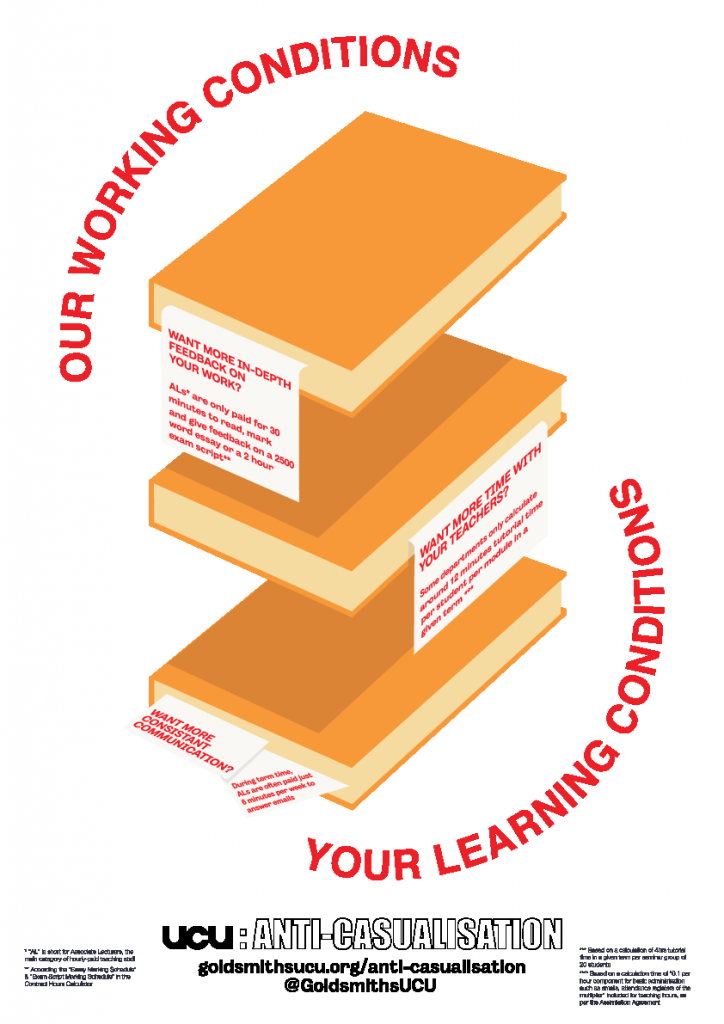
DID YOU KNOW, at Goldsmiths, over 61% of academic staff are casualised?
In Goldsmiths, as in many HEIs across the sector, the university relies increasingly on a reserve army of casual staff. As front-line teachers, casual academic staff do a huge amount of the core-teaching at the college, yet suffer from financial insecurity and substandard working and pay conditions. When student numbers fluctuate, casual jobs are the first to be cut down, plunging people in already precarious financial situations further into insecurity.
- A report by UCU in 2015 found that 40% of university staff on insecure contracts said they earned under £1,000 a month.
- Almost a fifth (17%) said that they struggled to pay for food and a third (34%) said that they struggled to pay rent or mortgage repayments.
- A similar amount (36%) said that they struggled to pay household bills like fuel, electricity, water and repairs.
Casualised academic, research and professional staff are suffering from poor working conditions and precarious financial situations; and this has become normalised. This situation is very real for many staff members at Goldsmiths as has been demonstrated in the testimonies we received from hourly paid teachers this year. These material factors disproportionately affect teachers of colour and teachers from a working class background. The normalisation of casualisation within the sector is among the biggest barriers preventing people from mixed backgrounds entering into academic careers. Casualisation excludes those for who a sustained period of financial precarity is simply not an option.
This is all while casualised teachers work far beyond their contracted hours to support students who are being failed by the system. Casualised academics do most of the pastoral care work in the university and this is work that is not paid to them in their contracts. And this work tends to fall disproportionately on teachers of colour and womxn teachers. We know that students want and require more contact time with their teachers. Yet fiscal austerity has become so much common sense among HE management personnel that they would rather save money on the lowest paid teaching staff than to listen to students when they ask for improved learning conditions.
Precarity Trickles Up
Despite providing the majority of teaching at the college, hourly-paid academics are often isolated and disenfranchised workers. They are propping up a broken system with their good will and unpaid work. Temporary hourly-paid teaching is NOT a rite of passage or simply work experience. It is the mainstructural feature of the marketisation of higher education. Without the discount expertise of casualised academics, the system would not work. But a system that is intent on devaluing casual academic labour is one that is fully prepared to devalue all academic labour.
This ballot brings together the issues of casualisation and pension reform. Casual academics were among the most actively involved in the original pension strike. The solidarity that was built during 2018 strike was based on a common and broader concern for the future of the sector. Many casual academics will be eager to pursue the principles that underpinned the original strike which have since been vindicated by the JEP report. Now, however, is the time for permanent and senior staff to repay this solidarity by supporting their casualised colleagues.
We have the power to change things and we deserve better. If we ever hope to see a secure and fulfilling future in higher education, we need to take action on casualisation now!
Why should I vote?
- UCU members are voting against the disproportionate reliance on precariously employed staff and to protest the insecure working conditions for many of our key academic, research and professional staff
- It will force universities to commit to a new national-level action plan to create greater security of employment
- This is a crucial opportunity for UCU members who benefitted from the militancy of their junior colleagues during the USS strikes to show solidarity to a campaign that will drastically improve the working conditions of precarious workers.
- It is a powerful NO to one of the most scandalous consequences of the marketisation of higher education. A fight against casualisation is a fight for diversity in HE.
- VOTE YES/YES for Action over Pensions, Pay and Equality. Please also get involved with our local anti-casualisation work and build solidarity by posting our GUCU flyers and posters.